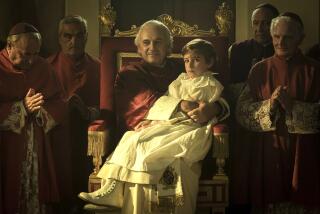Book Review : A Fresh Look at a Classic Tale : KIDNAPPED; OR, THE LAD WITH THE SILVER BUTTON; by Robert Louis Stevenson; Edited with introduction and notes by Barry Menikoff, Huntington Library Press $29.95, 334 pages
- Share via
“Why ‘Kidnapped’?” Barry Menikoff asks rhetorically in introducing this new edition of the Robert Louis Stevenson classic, in which the text we read as kids has been tweaked to conform with the original handwritten manuscript at the Huntington Library in San Marino.
After all, says Menikoff, a professor at the University of Hawaii and a leading authority on Stevenson, “the displacement of Gutenberg’s culture by that of the flashing pixel seems assured.” Why bother reissuing a 19th century book, especially one that’s already “one of the most popular novels in English?”
Menikoff offers several reasons. One is the opening of the new Scottish parliament, which makes Stevenson’s Scottish nationalism of some current interest. That nationalism is explicit in the plot of “Kidnapped”--which is set in 1751, five years after Bonnie Prince Charlie’s defeat at Culloden, when the English were trying to erase much Scottish culture, including traditional Highland dress--and implicit in Stevenson’s use of Scottish idiom, some of which his editors softened or omitted.
So the tweaking in this edition includes the restoration of such obscure locutions as allenarly (singly, solitarily) and notour (well-known, notorious), and the undoing of misguided corrections, such as editors’ substitution of “bit of fun” for “bit fun.” Menikoff supplies a glossary of dozens of such terms, copious notes, a gazetteer of place names, maps of David Balfour’s wanderings across the width of Scotland and reproductions of the drawings that accompanied the novel when it was first serialized in the Young Folks Paper in England in 1886.
Another reason, Menikoff says, is to overcome the misconception that “Kidnapped,” because its hero, David, is a teenager, is only a story for young folks, a boys’ adventure tale like “Treasure Island.” Stevenson and his contemporaries considered it a novel for grown-ups, Menikoff insists, pointing to the subtlety of the characterization, the complexity of the politics (David is a loyal subject of King George, and his companion on the road, Alan Breck Stewart, a confirmed rebel) and the realism that underlies the derring-do.
At bottom, though, Menikoff’s motives are simpler: He admires Stevenson immensely and has found a way of enticing us to read him again.
Stevenson, he asserts, was a master of prose style, almost as important a figure as Hemingway in the revolt against Victorian ornamentation. “The economy and rapidity of his actions, the vividness and limpidity of expression, and the entire story sustained by suspense--all these qualities are precisely suited to a contemporary reader’s visual experience,” Menikoff says. Even in the pixel age.
And, indeed, “Kidnapped” holds up quite well. Stevenson’s rebellion against the Victorians was only partial--the sexual side of life is ignored, and David, a strapping 17-year-old who kills more than one man in self-defense, can’t overcome his conviction that playing cards is sinful--but the narrative is smooth and swift.
It’s the same story we read as kids. David’s parents die; his uncle Ebenezer, to deny the boy’s claim to the estate of the Shaws near Edinburgh, has him shanghaied aboard the brig Covenant, bound for indentured servitude in the Carolinas. The brig sinks Alan’s boat and takes him aboard. David sides with Alan against crew members bent on stealing the money Alan has collected for rebel leaders in exile. They are shipwrecked off the west coast of Scotland, and must thread their way back through lochs and mountains and redcoat patrols to achieve their very different aims.
But of course it’s also not the same story. No good book seems the same if years have elapsed since we first read it; and this edition aims to convince us that our first reading, if we were kids, was much too long ago.
More to Read
Sign up for our Book Club newsletter
Get the latest news, events and more from the Los Angeles Times Book Club, and help us get L.A. reading and talking.
You may occasionally receive promotional content from the Los Angeles Times.







